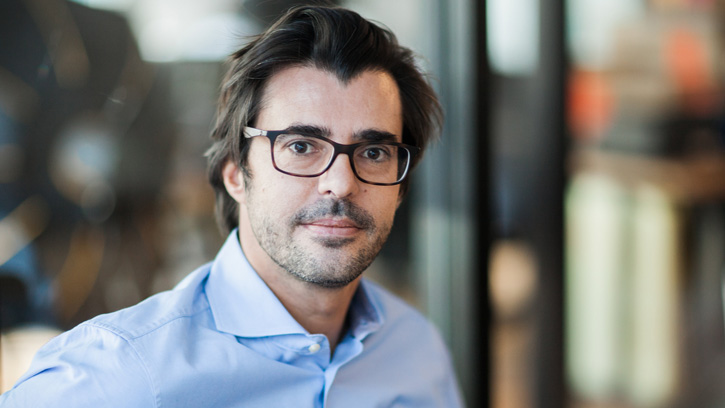Danone Ventures CEO on Investment Focus and Pandemic Shifts
STARTUPS & INNOVATORS
Laird Superfood fits the profile of companies that Danone Manifesto Ventures likes: Its products are focused on health; it is run by people passionate about their mission; and Laird pursues sustainability as a priority. So in April, Danone announced its complete funding of a $10 million financing round for Laird.
“Laird” is Laird Hamilton, the surfing icon who co-founded the company in 2015 with his wife, Gabriella Reese, an ex-Olympic volleyball player. They began creating products based on their own dietary regimen; offerings range from coconut water to superfood creamers to coffee infused with a blend of mushroom extracts.
“The company provides a combination of things that very much are in line with our usual investment decisions,” says Laurent Marcel, CEO of Danone Manifesto Ventures, the four-year-old corporate venture arm of the consumer packaged goods giant. “Their potential is high. And it provides a nice alignment with Danone’s larger focus on expanding our plant-based business.”
Danone launched its venture fund four years ago amid tumult in its markets to get in on the ground floor with young and innovative companies. Its focus is on startups that have something of a track record and that usually have attracted other early-stage investors.
The group’s middle name is important, too: “The belief that the health of people and the health of the planet are connected and interdependent is an integral part of Danone as a group, and it is an integral part of our DNA as an investor,” says Marcel, noting that CEO Emmanuel Faber has made this explicit “manifesto” an emphasis of his tenure, which began in 2014.
So far, Danone has invested in 17 companies that represent these attributes in a variety of ways. The first startup fleet included AccelFoods, an incubator and parent of brands such as JicaChips and Purely Pinole, and Yooji, a French maker of organic baby food. Besides Laird, more recent investments have included Epigamia, creator of India’s first branded Greek-style yogurt, and Forager Project, which makes cashew-based products.
A new emphasis by Marcel has been startups that leverage technology per se, not just consumable products, to advance Manifesto Ventures’ goals. Phenix, for example, is a “digital food bank” that tries to cut waste in the supply chain, while HowGood evaluates and grades products and brands for sustainability.
“We think [HowGood] can bring a different perspective on how we implement our sustainability program,” Marcel says. “They can help us change our footprint for good.”
The COVID-19 pandemic has stressed the startups and Danone’s relationships with them. “It’s more difficult to be a food startup these days,” Marcel says, “but at the same time we have observed the other side of the coin: the exciting ability of young companies to adjust rapidly to crisis.”
For example, Farmer’s Fridge, which broke new ground by installing salad-dispensing vending machines in office buildings and at airports, found its markets abruptly crushed by stay-at-home orders. So founder Luke Saunders pivoted to expand healthy vending in the hospital sector and quickly refashioned his distribution system to provide direct-to-consumer delivery. “That business Farmer’s Fridge has added will remain after the crisis and be incremental for them,” Marcel says.
Meanwhile, Marcel notes, Harmless Harvest, a survivor of the coconut water scrum, is managing the crisis well. “It was interesting to see that this company that you’d consider small is already trusted by consumers, so they stuck with it,” he says.
The pandemic has forced Danone Manifesto Ventures to redirect some resources toward boosting the survival of its existing partners instead of evaluating potential new investments. The startups’ challenges included depending on co-packers, many of which faced sudden spikes in demand from multiple clients. Makers of niche brands also have been confronted with decisions by many retailers to “reduce assortments during the pandemic and focus on bigger players,” Marcel notes. “We allocated more attention to operational and strategic support, such as working with them on health and safety measures in factories and the dynamics of distribution channels.”
In the post-COVID era, the venture fund will look even more critically than before at startups’ business performance. “But we’re still very much on the look because the crisis will accelerate changes and present new business models,” Marcel says. “There will be lots of exciting opportunities.”


